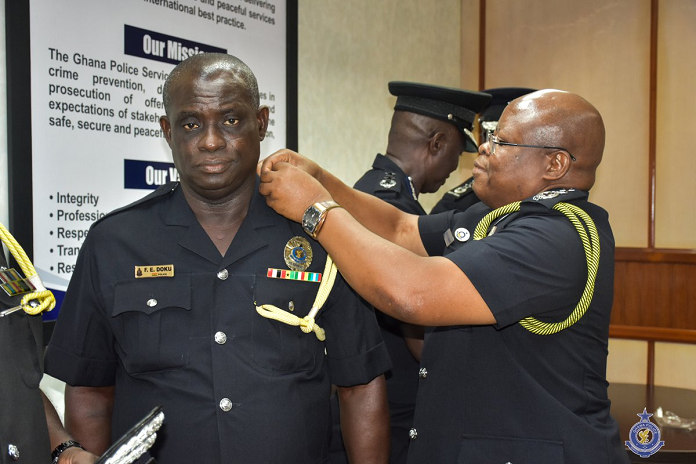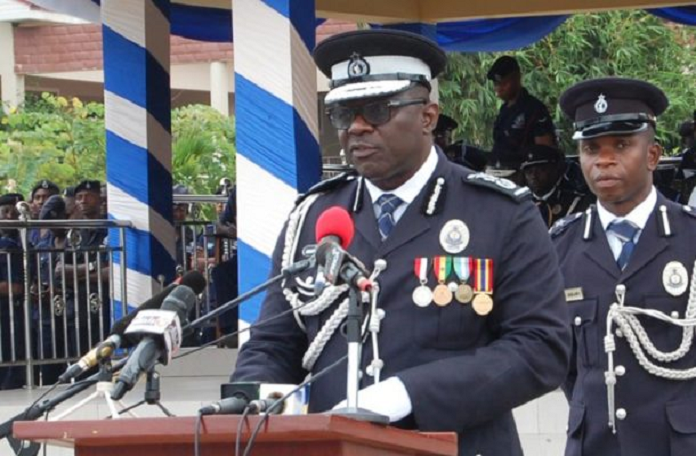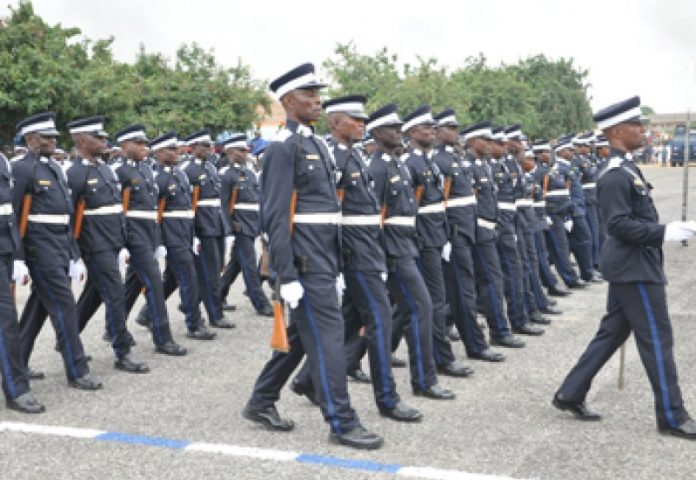The Ghana Police Service is the agency in charge of protecting its citizens from internal aggression. As provided in the Ghanaian constitution of 1992, its mandate is to detect and prevent crime, maintain public order, and preserve lives and property.
Its functions also include but are not restricted to motoring traffic duties to ensure safety on the roads, issuing police criminal check certificates to offenders, day and night patrol to safeguard residential areas. They also provide security for government agencies and work with other security outfits in the government and private sectors to detect criminal tendencies quickly and work towards ensuring peace and tranquility in the country.
The agency is under the supervision of the Ghanaian Ministry of Interior under Ambrose Dery’s command (Minister of Interior). It has a strength of 23,684 sworn and 9,000 unsworn patriotic officers who are willing to give their lives for their country.
Ghana Police Service Ranks In Ascending Order

- Constable
- Lance Corporal
- Corporal
- Sergeant
- Inspector
- Chief Inspector
- Assistant Superintendent
- Deputy Superintendent
- Superintendent
- Chief Superintendent
- Assistant Commissioner
- Deputy Commissioner
- Commissioner
- Deputy Inspector General
- Inspector-General of Police
Salary Structure Of Ghanaian Police Officers
The Ghana Police Service salary structure is such that the higher your rank, the higher the salary allocated. In 2010, there was a new salary scheme for Ghanaian Police Officers known as the Single Spine Salary Structure (SSSS). The system was initiated to ensure that the Officers enjoy better payment schemes than previously upheld.
Thus, under the new salary scheme, newly recruited University graduates can earn up to GhC1,400 (Ghanaian Cedi) while a fresh West Africa Senior Secondary Certificate Examination (WASSCE) result holder placed in the rank of Constable receives a monthly salary of GhC700. However, the average monthly salary of Police Officers varies based on experience, gender, location, and skills.
The Salary Structure Can Also Be Determined as Follows:
- Salary Range: Salaries for university graduates range from GhCb1,320 ( lowest) to GhC4,450 (highest)
- Median Salary: This is the category that earns between the highest and lowest paid earners (Middle earners). The median salary for officers in Ghana is GhC3,090 per month.
- Percentiles: The percentile salary is the estimated value of salary, which officers earn. They are the 25th and 75th percentiles. It goes to show that 25% of officers earn less than GhC1,320, while 75% of Police officers earn more than GhC1,980.
Other Determinants of Salary in the Ghana Police Service Include:
- Experience: An officer with less than two (2) years of experience earns about GhC1,490 monthly. An Officer with experience between two to five years earns about GhC1,990 monthly. Other Officers with experience levels between five to ten years earn about GhC2,950. Officers with experience between ten to fifteen years earn about GhC3,950. Averagely, salaries double when they hit the ten years experience mark. Officers with experience of fifteen to twenty years take-home salaries of about GhC4,240.
- Gender: Female Police Officers are paid less than male officers. Averagely male officers are paid about GhC3,040 while female officers are paid GhC2,680.
- Education: The higher the educational qualification, the higher the pay. An officer with a high school level of education is paid about GhC1,700. A Certificate or Diploma gets a salary of about GhC2,670. A Bachelors Degree holder earns an average of GhC4,480.
Incentives Enjoyed By Ghanaian Police Officers
Gallant Officers of the Ghana Police Service are entitled to incentives and welfare packages, which include but are not restricted to the following:
- Free health care services for officers and their families at designated state-owned hospitals across the nation to the tune of GhC12,500.
- Annual leave of twenty eight (28) working days and casual leave.
- Sick leave (depending on doctor’s recommendation).
- Accommodation at the Police residential quarters.
- Insurance cover of about GhC50,000 in the event of death while he/she is in the line of duty. If the officer dies accidentally or naturally while on active duty the family gets a GhC25,000 package. If an officer suffers a permanent disability in the discharge of duty will also be entitled to GhC25, 000.
- State-of-the-art equipment to enhance their performance and safety.
- Granting of loans from Police welfare fund to enable officers to cover projects like housing and starting up businesses to augment their pay.
- Restructuring the training of 665 personnel of the Motor Traffic and Transport Department of the force to demonstrate professionalism and improve their skills.
- Establishment of the police welfare scheme to make it a priority to enact policies that will uplift the morals of Officers so they will be motivated to perform optimally.
- Ensuring that Officers due for promotion are duly promoted without bias and paid their entitlement accordingly.
Structure of The Police And How The Ranks Work

The Ghana Police Service is led by the Inspector-General of Police. Since Ghana has ten (10) regions, the Police Service is divided into twelve divisions. Ten of the twelve divisions represent the 10 regions of the nation. The 11th division is assigned to the seaport of Tema, the industrial center of the nation. The last division represents the railways, harbor, and port division. They also have a Special Unit called the Marine Police Unit inaugurated in Takoradi on 21st June 2013, which handles offenses regarding the oil and gas sector.
For each of the regions, there is a Regional Commander who executes administrative and operational functions within the jurisdiction of the region. In operative functions, the Regional Commander works hand in hand with the Regional Operational Commander. In administrative functions, the Regional Commander is assisted by the Deputy Regional Commander and the Regional Crime Officer. The Deputy Inspector-General of Police is assisted by the Director-General of the Police Administration who supervises the activities of the Regional Commanders of the Police Service.
The administrative system is decentralized, and apart from the National Headquarters in Accra, all regional commands have subdivisions. The Ghana Police Service also has special units which include:
- Motor Traffic and Transport Unit (MTTU)
- Public Affairs Directorate
- Domestic Violence and Victims Support
- Crime Offices
- Finance Offices
- Arms and Ammunitions
- Highway Patrol
Promotion Of Police Officers
The Ghana Police Council is the agency that foresees the promotion and welfare of Police Officers as provided in Regulations 37 of C.I. 76 of the Police Service Regulation 2012. As provided by the regulatory body, promotions are awarded based on the following factors;
- Passing of required promotion examination
- Seniority
- Length of years served
- Satisfactory performance assessment based on conduct
- Recommendations based on acts of bravery in the line of duty
- Maintain a high standard of efficiency
- Educational qualification
- Experience
- Officers have no case of gross misconduct
- Promotion is subject to the availability of a vacancy
- The officer passes the necessary interview required
- The officer possess a high standard of discipline and patriotism which serves as an inspiration to other officers and citizens alike
Requirements For Joining The Ghanaian Police Service

The Ghana Police Service employs potential candidates who meet with the following criteria:
- Persons who are Ghanaian citizens.
- Persons who are of sound mind and body.
- Those who have no existing records of misconduct or have an awaiting case with the authorities.
- Persons who have a minimum qualification of General Examination Certificate or its equivalent.
- If you have completed the compulsory National Service.
- Persons who are medically fit.
- You must be younger than 21 years and not more than 28 years old at the time of applying
- Persons who possess a minimum height of 5 feet 8 inches for males and 5 feet 4 inches for females.
- Persons who have valid identification documents i.e. Identity card
- Must be of good character and can provide a guarantor to sign on your behalf.